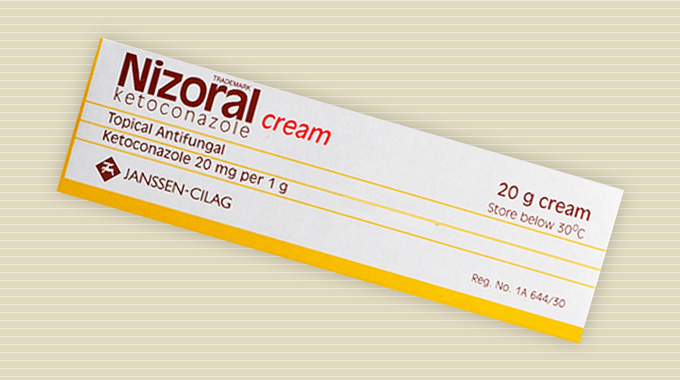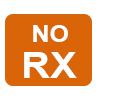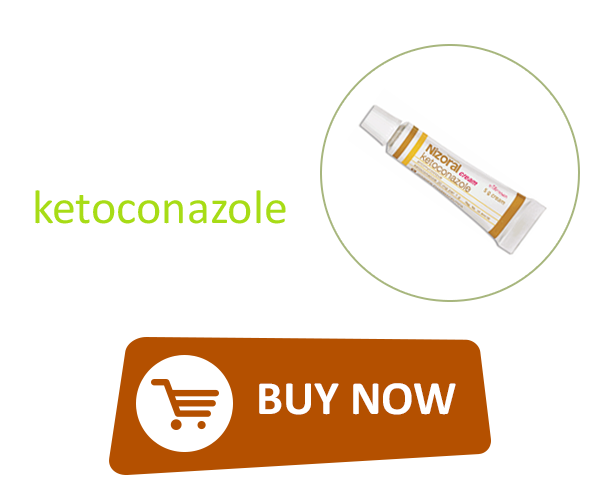Nizoral Cream (ketoconazole)
Nizoral cream is an imidazole antifungal agent. The generic name of nizoral cream is ketoconazole and is available under the brand name of kuric and Nizoral.

Composition
Nizoral cream consists of the synthetic broad-spectrum antifungal drug- ketoconazole 2% prepared in an aqueous cream containing cetyl alcohol, purified water, stearyl alcohol, butylated hydroxyanisole, isopropyl myristate, polysorbate 80, polysorbate 60 and propylene glycol. The molecular formula of ketoconazole is C26H28Cl2N4O4 with a molar mass of 531.43 g/mol.
Uses
This drug works by destroying the sensitive fungi by interrupting with the production of the cell membrane of the fungi and weakening it. The damaged cell membrane permits the contents to exit out and results in the fungal death. Ketoconazole is used for the treatment of the fungal skin infections like jock itch, athlete’s foot, ringworm and certain types of dandruff. This drug may also be used to treat pityriasis which causes the darkening or lightening of the skin of the chest, neck, legs or arms.
Dosage
The recommended dosage for Nizoral Cream (ketoconazole) is as follows:
For topical use:
- Clean and dry the affected area before applying the cream.
- Apply a thin layer of Nizoral Cream to the affected skin and surrounding area.
- Gently massage the cream into the skin until it is evenly distributed.
- Use Nizoral Cream once or twice daily, as directed by your healthcare professional.
- Duration of treatment may vary depending on the severity of the condition, so follow the instructions provided by your doctor.
It is important to follow the dosage instructions provided by your healthcare provider. If you have any questions or concerns regarding the appropriate dosage or usage, consult with your doctor or pharmacist for further guidance.
How to Use
Nizoral cream should be applied on skin only. Thoroughly clean and dry the region to be treated. Apply this cream to the affected area generally once or twice in a day as instructed by your doctor. Length of treatment and dosage depends on the kind of infection being nursed. Wash your hands after applying this medicine. Do not apply this cream in the nose, eyes, vagina or mouth. Rinse thoroughly with water if the cream gets into the eyes. This medication must be used regularly to gain the full benefit.
Side-Effects
Swelling, stinging, burning, redness, peeling or irritation of the treated skin may commonly occur. If any of these side-effects worsen or persist, inform your doctor right away. Keep in mind always that your doctor has given you this medicine because he/she believes that the advantages to you are greater than the dangers of the side-effects. Many patients using this cream do not have any adverse side-effects. Very serious allergies to this medication are unlikely, but get immediate medical help if it occurs. Symptoms of allergies include: itching/swelling of throat, tongue or face, severe dizziness, blistering, rashes and trouble breathing. There may be several other possible side-effects to this drug which are not mentioned above.
Contra-indications
Tell your pharmacist or doctor before using this drug if you are allergic to ketoconazole or other azole antifungal agents like econazole, clotrimazole or miconazole or any other allergic reactions. This product contains several inactive components which cause allergies or other problems. This drug is contraindicated in the patients having low levels of blood sugar, porphyria (a blood disorder), liver disease, sulfite sensitivity or excessive alcohol use.
Pregnancy and Nizoral cream
Contact your pharmacist or doctor if you become pregnant. You will need to talk about the risks and benefits of using this medication during pregnancy period. It is unknown whether the nizoral cream is capable of passing into the human milk. But to be on the safer side, do not breast-feed while consuming nizoral cream.



